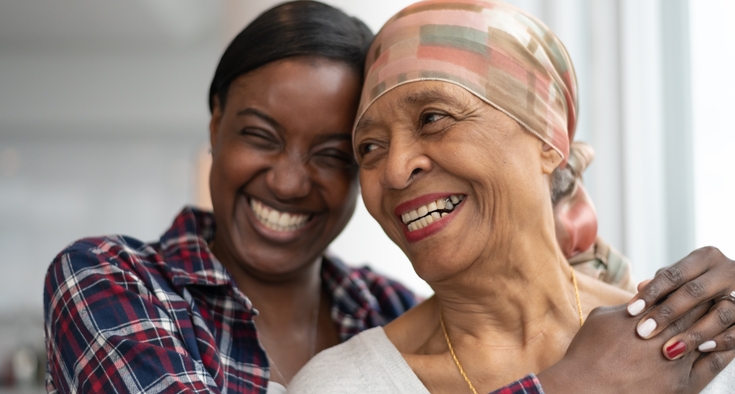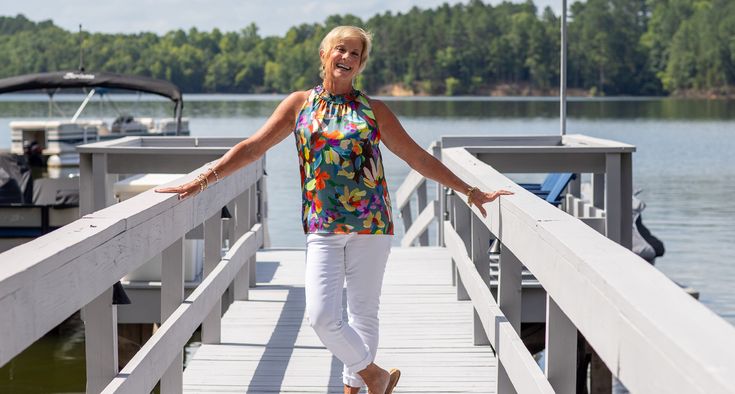The journey through cancer treatment is often fraught with anxiety and uncertainty. As patients approach the end of active therapy, new concerns may pop up: Will the cancer return? How will my life be different now?

At Novant Health Cancer Institute - Greensboro, adult-gerontology nurse practitioner Kristin Curcio spends time with each patient to discuss what steps they’ll need to take to recover from their treatment. It involves more than just managing the physical effects of the disease — she says it's about finding a “new normal” and figuring out how to prioritize their overall well-being.
Curcio shares an inside look of what survivorship looks like, along with practical advice for embracing life after cancer.
Supportive care for your cancer journey.
What are the biggest challenges cancer survivors face after treatment?
It’s really about finding a ‘new normal.’ There can be lingering side effects like fatigue, emotional struggles like anxiety and the uncertainty of what comes next. At Novant Health Cancer Institute - Greensboro, we help patients focus on their overall health, from exercise and diet to making sure they’re up-to-date on screenings and vaccinations.
Beyond fatigue and anxiety, what are some less obvious challenges survivors might face? How does your clinic address those?
Cancer survivors may experience cognitive changes, financial insecurity and body image issues. They may also struggle with the fear of recurrence. We address these challenges by connecting patients with resources like occupational therapy, rehabilitation services, financial assistance programs, counseling, support groups and regular follow-up appointments. Learn more about our comprehensive cancer support services.
What are some practical tips you give survivors to help them manage the physical and emotional after-effects of treatment?
- Prioritize rest and sleep: Fatigue is a common side effect of cancer treatment. We encourage patients to listen to their bodies and rest when needed.
- Maintain a healthy diet: Eating a balanced diet can help with recovery and energy levels.
- Engage in regular exercise: Exercise can help reduce fatigue, improve mood and boost overall well-being.
- Seek emotional support: We encourage patients to talk to friends, family or a therapist about their feelings and concerns.
- Join a support group: Connecting with other survivors can provide valuable support and encouragement.
Top scores for safety in NC
Novant Health received the most ‘As’ for patient safety in North Carolina from The Leapfrog Group. With a focus on safety, quality and patient experience, the national, industry-leading nonprofit, evaluates and assigns letter grades ranging from A to F to hospitals across the country. Novant Health’s hospitals with “A” grades outperform 70% of hospitals nationwide for safety and quality.
Tell us why you recommend the personalized care you provide at Novant Health Cancer Institute.
In Greensboro, it’s a full-service clinic, staffed by two physicians and me. Patients can receive chemotherapy, IV treatments, medications for nausea and more. But it's not just about the medical side — we're also here to help with the emotional and practical aspects of survivorship. Not everyone needs extra resources, but it's important they know they're available and can access them easily. And wherever you live within the Novant Health footprint, the cancer institute has a team at the ready.
What does a personalized survivorship care plan include?
We don’t want people to feel lost or alone once active treatment ends. That’s why we create personalized survivorship care plans. It details the specific drugs they received, the treatment timeline, any complications and recommendations for follow-up care. It also outlines symptoms to watch for and when to contact us.
How do you measure the success of your survivorship care plans, and what adjustments do you make based on patient feedback?
The success of our survivorship care plans is measured through patient surveys, tracking health outcomes and quality improvement initiatives. Patient feedback is used to make improvements, and health outcomes like recurrence rates and overall well-being are monitored to assess the effectiveness of the plans. Data from these sources is then used to identify areas for improvement and implement changes.
Why is staying up-to-date on vaccinations important for cancer survivors?
Vaccinations are important for cancer survivors because their immune systems may be weakened due to treatment. This could make them more vulnerable to infections. We also address common misconceptions that people might have:
- The belief that vaccines are unnecessary after treatment.
- The fear that vaccines will weaken the immune system further.
- The concern that vaccines will interact negatively with cancer treatment.
We’re happy to explain how vaccines work to strengthen the immune system and assure patients of their safety in consultation with their oncologists.
Why do you think some patients continue to see you for follow-up appointments even years after treatment?
It’s because of the relationships we build. We become like a second family to many patients. Some want that reassurance and support, while others want to be proactive about their health and make sure there are no signs of recurrence.
What advice would you give to someone who just finished cancer treatment?
Here’s what I’d recommend:
- Find something to focus on outside of outside of cancer, like a hobby or passion project.
- Spend time with loved ones and friends.
- Don't be afraid to seek out support groups or resources.
Helping patients when they need it most
Editor’s note: Nurse practitioner Kristin Curcio share a few examples of how primary care physicians can step in to help patients find their way.
I had a patient in his early 70s who ate a chicken and biscuit three times a day. His cholesterol was high, diabetes uncontrolled and his leg was swollen (a result of too much sodium in his diet). Educating this patient on proper nutrition was key.
I sent him to a Novant Health diabetes and nutrition center, where he could sit one-on-one with a registered dietitian who helped him come up with a healthier eating plan. Now, his diabetes is under control and his leg is no longer swollen. Plus, his blood pressure and cholesterol levels have improved because he’s eating better and taking medication.
If you have a specific health challenge, you might be tempted to call up a specialist. I recommend seeing a primary care physician first because they can help guide you on where and how to receive the best possible services.
I also had a patient who was unable to work during treatment. She was worried about her finances, as most of us would be. We were able to refer her to our social work team within the cancer institute who helped connect her with resources like how to apply for disability and to services that helped with transportation and even some financial assistance. She was able to focus more on her cancer treatments and taking care of herself.









